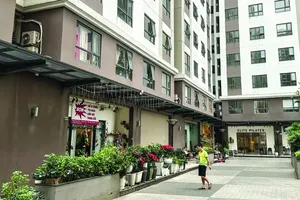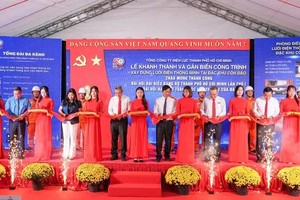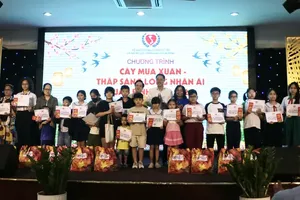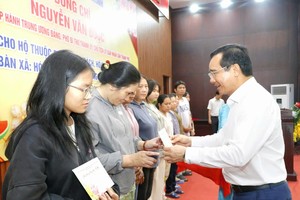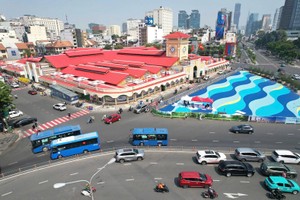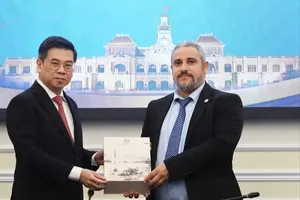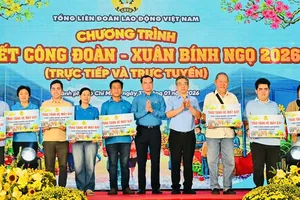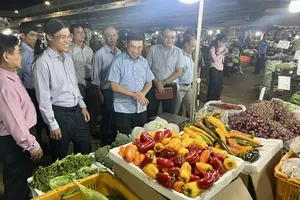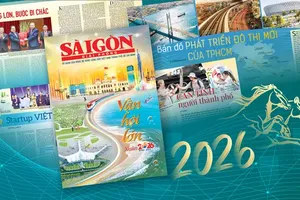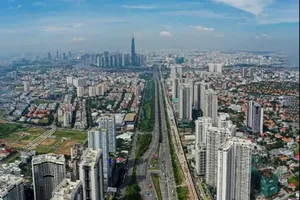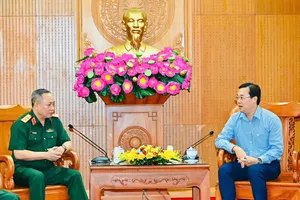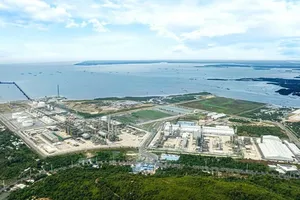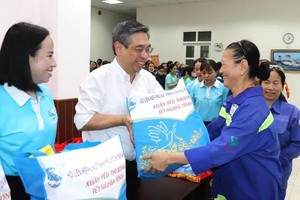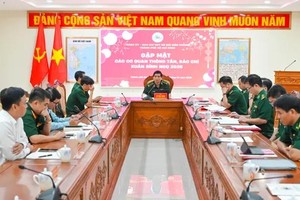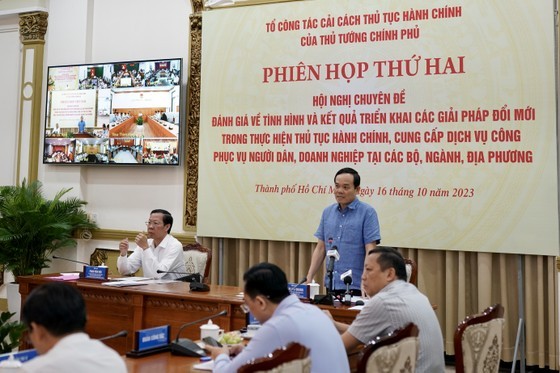 |
Deputy PM Tran Luu Quang speaks at the meeting. |
On the morning of October 16, in HCMC, the Government Office's Administrative Procedure Reform Working Group (referred to as the Working Group) held its second online session with localities to evaluate the situation and results of implementing innovative solutions in administrative procedure reform and the provision of public services for citizens and businesses in various ministries, sectors, and localities.
Mr. Tran Luu Quang, Member of the Party Central Committee, Deputy Prime Minister, and Head of the Working Group, presided over the meeting. Mr. Phan Van Mai, Member of the Party Central Committee, Permanent Deputy Secretary of the HCMC Party Committee, and Chairman of the HCMC People's Committee, attended the meeting.
In his opening speech at the meeting, Deputy Prime Minister Tran Luu Quang highlighted that this session was focused on reviewing the outcomes of administrative procedure reform, pinpointing areas where constraints persist, and putting forth solutions for enhancement in the upcoming period.
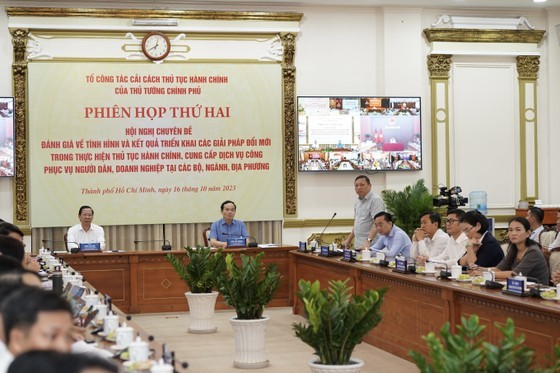 |
Mr. Ngo Hai Phan, Director General of the Vietnam Government Office's Administrative Procedure Control Department, reports at the meeting. |
According to Mr. Ngo Hai Phan, Director General of the Vietnam Government Office's Administrative Procedure Control Department, during the first nine months of 2023, the electronic processing rates for administrative procedures in various ministries, sectors, and localities were 22.48 percent and 38.94 percent respectively. This marks a significant increase compared to 8.78 percent and 13.14 percent during the same period in 2022.
Moreover, the transition from paper-based documents to electronic records in ministries and sectors reached 81.39 percent, a substantial improvement from 50.69 percent in the same period last year. Localities also achieved a rate of 70.24 percent, up from 38.84 percent in the corresponding period. This contributes to the establishment and operation of specialized national databases such as population, social insurance, business registration, electronic citizenship, and driver's licenses.
However, there are still existing limitations and challenges. Specifically, the quality of administrative procedure implementation and the satisfaction level of citizens and businesses have improved but not significantly. There are still instances of bureaucracy, negativity, and the generation of additional administrative procedures, documents, and paperwork beyond regulations. The upgrade of online administrative procedure resolution systems in some ministries, sectors, and localities remains slow. Additionally, the discipline and administrative rigor of some agencies and units are not yet strict enough.
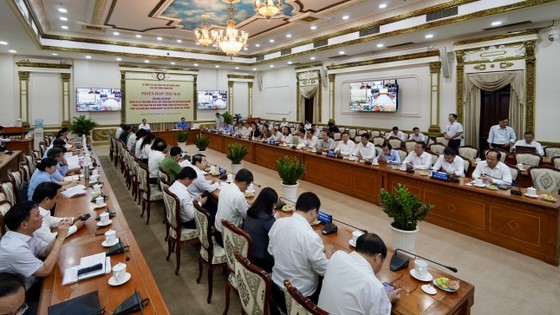 |
The scene of the meeting |
At the meeting, Mr. Phan Van Mai, Chairman of the People's Committee of HCMC, recognized the limitations and challenges in the administrative procedure reform endeavors in the city. These challenges are not only attributed to the large volume of paperwork but also to subjective factors, encompassing administrative discipline, rigor, and the effective, resolute, and coordinated leadership of administrative agencies.
Furthermore, there are several issues that ministries and sectors should take into account. These include discrepancies between the total number of documents that have been resolved and the data updated on the online public service portal compared to HCMC's data. Additionally, some administrative procedures have not yielded any cases over the past three years.
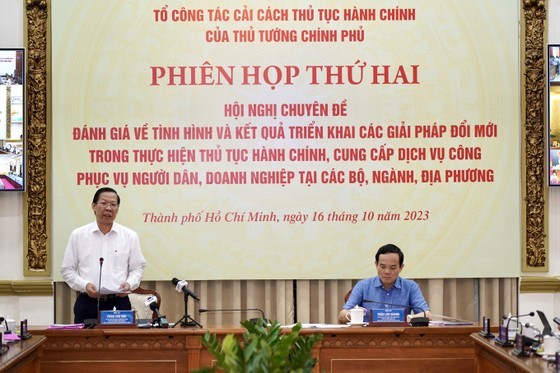 |
Mr. Phan Van Mai, Chairman of the People's Committee of HCMC, speaks at the meeting. |
To tackle these existing limitations and challenges, HCMC has introduced a plan for administrative procedure reform until the end of 2023. This plan delineates 32 specific tasks with clear timeframes, with the goal of completing the administrative procedure reform initiatives mandated by the government by the year's end.
Additionally, HCMC plans to issue directives to streamline administrative procedures for citizens and businesses, resolving them within the internal purview of departments, sectors, and localities. Furthermore, the city will complete the implementation and harness the capabilities of the City's Working Group to continue monitoring, reviewing, encouraging, and ensuring the accomplishment of tasks throughout 2023. Mr. Phan Van Mai suggested that the government address bottlenecks in data connectivity and sharing, conduct reviews, and eliminate administrative procedures that have not generated records over the past three years.
In his closing statements, Deputy Prime Minister Tran Luu Quang recognized that recent administrative reform efforts have produced initial results. While these outcomes may not fully meet the desired expectations, they are nevertheless encouraging. He encouraged various ministries, sectors, and localities to persevere with their efforts in the coming period. Additionally, Deputy Prime Minister Tran Luu Quang emphasized the importance of expanding and adopting successful models and practices that have been developed in some localities.
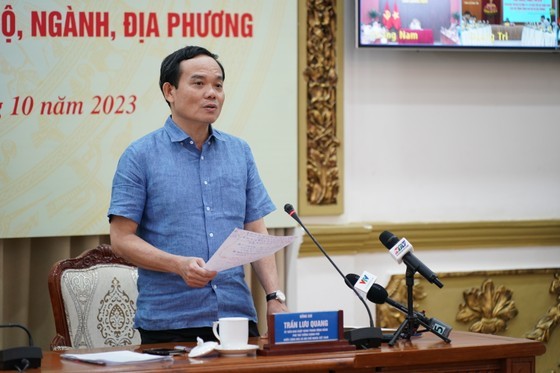 |
Deputy PM Tran Luu Quang speaks at the meeting. |
Furthermore, the Deputy Prime Minister also noted that there are many existing limitations and challenges that need to be addressed. These include a lack of comprehensive, synchronized, and interconnected databases among various ministries, sectors, and localities, as well as inadequate coordination and lower service quality. Additionally, the involvement of businesses and citizens remains limited.
Consequently, Deputy Prime Minister Tran Luu Quang called upon different ministries, sectors, and localities to effectively implement the suggested solutions. Each level and each sector must consider administrative procedure reform as a pivotal mission, as this is a global trend.
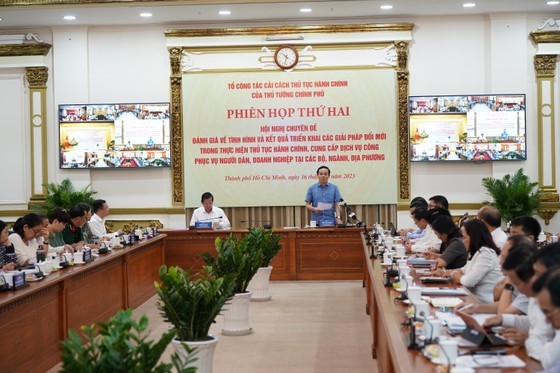 |
The scene of the meeting |
Simultaneously, it is crucial to empower leaders and reevaluate and replace obsolete processes with genuinely transparent and efficient procedures to minimize unnecessary procedures.
In particular, there should be fairness between State agencies and citizens and businesses. It is imperative to strengthen collaboration and clearly identify the role and responsibilities of each ministry and locality, ensuring that a single unit is held accountable rather than having multiple agencies oversee the same specific tasks.
Moreover, it is crucial to establish system synchronization, enhance connectivity, and facilitate data sharing. Every ministry, sector, and locality must exhibit adaptability, especially when determining implementation priorities.
Endorsing the suggestion to eliminate procedures that have not generated documents in the past three years, the Deputy Prime Minister urged ministries, sectors, and localities to review and eliminate inefficient procedures to focus on other tasks. Additionally, there should be heightened monitoring, supervision, and initiatives to drive the execution of Action Plan 06. Paying heed to the input from citizens and businesses is also vital for making timely adjustments that align with their needs.
